Films in the PFF Award 2023
***Grand Prize***
Retake by NAKANO Kota (110 min.)『リテイク』
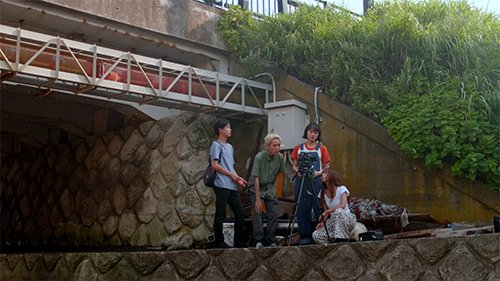
A female student decides on a whim to make a movie over her high school’s summer break, enlisting the help of four old and new friends. The relationship dynamics change as the group get closer to finishing the movie.
High schooler Kei takes photos as a hobby. He treasures some covertly snapped images of a girl in his school named Yu (his crush unbeknownst to her). One day, Yu catches Kei sneaking a picture of her from a local bridge. She suddenly declares she wants to direct a movie and asks him to be her cameraman and to find her a lead actor. Kei calls up his old buddy Jiro, who has drawing skills, and he’s immediately cast as a painter. Yu’s classmate Umi will assist the production and act alongside Jiro as a couple who journey to a land where time has stopped. The team realizes their sound is lacking and secretly borrow a proper mic from the broadcast club. Kei impulsively hires Yu’s ex-bandmate Arisa to record. As the quintet shoot each scene, their personal feelings and histories are revealed, particularly during the “retakes”...
■The first half of the film plays out in linear fashion until, following its namesake, director NAKANO Kota brilliantly doubles and triples the story back on itself to add richness and texture to the main plot. The final sequence takes the concept even further, illustrating that filmmaking itself is living in the moment.
**Runner-Up Prize**
Touch by TAKADA Kyosuke (56 min.) 『ふれる』
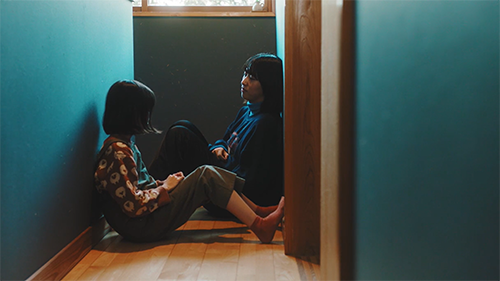
An elementary schoolgirl comes to terms with the loss of her mother and changes in her family over the final summer in her hometown before moving away.
10-year-old Misaki is a precocious, sensitive girl who still feels the presence of her late mother at home. Misaki sets a place for her mom at the table and won’t let anybody sit in her chair. Her father now has a new girlfriend and wants the family to move on as best they can, but accepts that Misaki takes life at a different pace than her older sister. Misaki’s hobby is pottery and she receives lessons with a local potter, feeling solace when shaping the clay in her hands. After accidentally breaking a classmate’s artwork at school, Misaki runs away from home. That evening she inadvertently joins a traditional obon festival procession and has an unexpected encounter, before waking up in hospital with a bandaged head. The family prepare to leave the ghosts of the old house behind and move to a neighboring city, but Misaki will carry some things with her for the rest of her life...
■Director TAKADA Kyosuke crafts an impressively mature, sure-handed drama which beautifully captures the presence of someone who has left the physical world. Young actress SUZUKI Yui, who plays Misaki, is a true discovery.
*Special Jury Prize*
The Bon Festival(working title) by TERANISHI Ryo ( 28 min.) 『うらぼんえ』
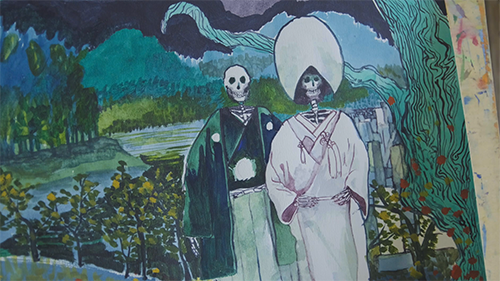
An art class teacher is influenced by a student to create a painting dedicated to his late son, who drowned as a child. When he later helps a middle-aged man who collapses at the beach, it leads to a surprisingly poignant realization.
Shinji has recurring dreams of reaching out to save his son Keita, who drowned as a youth. So vivid, in fact, that he wakes up with an injured arm from the tight grip of a hand. In the art class Shinji teaches, one of his students paints a mukasari ema (portrait of a post-mortem marriage), which inspires Shinji to do the same for his son. When his students accompany him to the the seashore location depicted in his previous painting, Shinji helps revive a drunken, middle-aged man. He accompanies the man back to his house, where his family carry out preparations for the coming obon period. Shinji is surprised to notice that their son is a dead ringer for Keita. He calls his mother to tell her, but she has an even more surprising revelation...
■Filmmaker TERANISHI Ryo collaborated with his cast from the writing phase, which gives this short a thoughtful, carefully developed feel. The unexpected reversal of fate is handled with a sure hand, with a poetic visual payoff that embodies the true spirit of obon.
*Special Jury Prize*
Cage by TACHIBANA Ryo (66 min.) 『鳥籠』
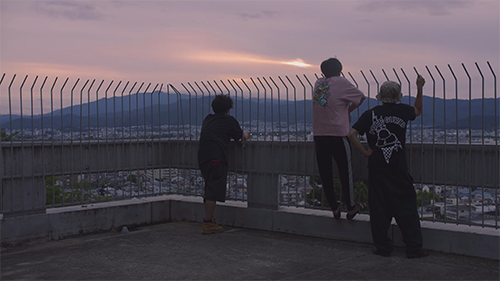
The bonds between a tight group of four, aimless suburban teens begin to fracture when an older neighborhood boy introduces them to drugs.
Kodai, Jin, Kengo, and Kazuki have grown up together on the streets of their suburban neighborhood. They spend their days hanging out in the local park, shooting hoops, smoking, and listening to hip hop. They all put up with issues at home and don’t have much hope for the future beyond getting jobs after high school, except for Kodai, who has a vague desire to go to university and have a family one day. One night, an older neighborhood boy introduces them to marijuana. Kazuki quickly becomes the point man for the dealer, encouraging his buddies to continue smoking up. Jin and Kengo drift along with the situation but Kodai strongly feels he’s on the wrong path. Finally gaining support from his wayward, financially challenged mother, Kodai puts all his energies into studying for his university entrance exam. How will things turn out for these once inseparable buddies?
■Director TACHIBANA Ryo drew on his upbringing in the Osaka suburbs in depicting the divergences that a close-knit group of friends inevitably experience. The scenes play out in a naturalistic manner without any affectations among the young cast. TACHIBANA tells a familiar story with a fresh approach.
*Special Jury Prize*
ReversiblelbisreveR (working title) by ISHIDA Shinomichi (77 min.) 『リバーシブル/リバーシブル』

A man living with a mental disorder works as a driver for an outcall escort service to support his son and meet women.
Middle-aged Shinpei lives with mental issues and is supported by regular visits from his caregiver. She encourages him to stick to his meds, take regular baths, and tidy up. While Shinpei has trouble with self-care, he’s also cognizant enough to get a job to support his adult son, Kai. Accompanied by Kai, he drives escort women to and from their outcalls and carries out menial tasks at the dispatch office. He’s drawn to one quiet young woman in particular named Misaki. Misaki claims she can see fairies, which provides her solace. At dinner, Shinpei confesses his feelings and Misaki agrees to spend time with him. Shinpei is overjoyed, but his caregiver has concerns about the reality of dating a woman engaged in sexual services. Kai is also rudely pranking Shinpei every night, so they hold a house meeting to decide how make everyone happier. Is it all a figment of Shinpei’s imagination? Does it matter?
■Director ISHIDA Shinomichi worked as a caregiver for 12 years and draws on his experience with those suffering from schizophrenia in crafting his protagonist. The film’s strong empathy for its troubled characters and their desires makes it relatable despite the societally “difficult” position they inhabit.
**Entertainment Award (Hori Pro Prize)* *
Perfect Young Lady by WATANABE Ryuhei (65 min.) 『完璧な若い女性』
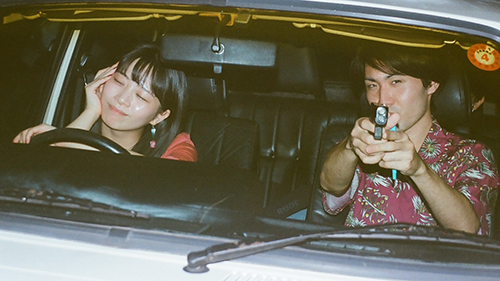
Two childhood friends hang out in their hometown during their summer break as they’re carried along by a mysterious cassette of pop songs.
Kurobe is a Tokyo freeter who’s back in Shizuoka for the annual summer fireworks. He runs into his childhood chum Erika on the streets and the pair casually agree to drive around in her estranged father’s vintage Volvo. Erika shares a tape cassette of pop songs delivered to her house by an anonymous artist known as “Perfect Young Lady.” Were they recorded by Kurobe’s childhood crush, Shione? As the pair hang out and talk over the old days and issues with their folks, the slow summer is punctuated by music videos of a cute girl singing in various town locales they visit: the abandoned water park, a retro bowling alley, and a love hotel. Will Kurobe discover the true identity of the “perfect young lady”? Is she even real? In the end it may not matter, as Kurobe and Erika discover something more valuable along the way.
■Director WATANABE Ryuhei draws from the kayōkyoku (hit song) movies of the 1950s to 1970s, where lyrics inspired freewheeling love stories with musical numbers. With its colorful, Showa-style opening credits and infectious musical interludes, the film is more than pastiche as it delves into the true nature of personal relationships.
* Cinema Fan Award (Pianist Prize) *
See You Then by ISHIKAWA Taichi (52 min.) 『じゃ、また。』
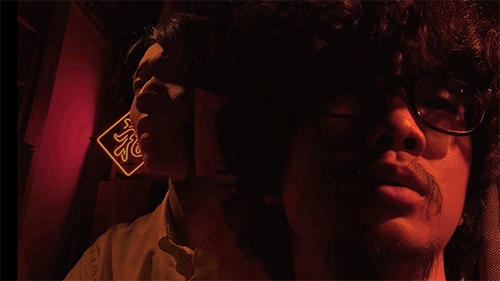
When a former filmmaker now dwelling as a hikikomori is suddenly visited by an old classmate, he’s given a second chance at a creative life.
27-year-old Nariyasu spends his days lying around doing absolutely nothing. He doesn’t even know what month it is. A figure suddenly appears in his apartment. It’s his old film school mate, Shuta. Shuta looks through Nariyasu’s books, but strangely claims “I came here because I thought you were searching for something.” Shuta pushes Nariyasu to continue playing their board game of Life, which they never finished years ago. The pair shot a movie together at film school, but it remains uncompleted. Nariyasu ran out of ideas, failed at his job search, which has led to his current inert state. “I can’t call it living,” he admits. Nariyasu follows Shuta out of the apartment and into a deserted cinema and gets knocked out. The story replays from the beginning and we’re now given an additional detail –– Shuta is already dead. But why has he paid this visit to Nariyasu?
■Stories that take place during obon naturally focus on family members, but director ISHIKAWA Taichi (who also plays Nariyasu) switches it up to a dearly departed friend. The tight confines of the apartment are keenly framed, with the cinema set evoking a separate compartment of the protagonist’s mind.
* Audience Award *
Memory Devices by TAKAHASHI Sota (71 min.) 『移動する記憶装置展』
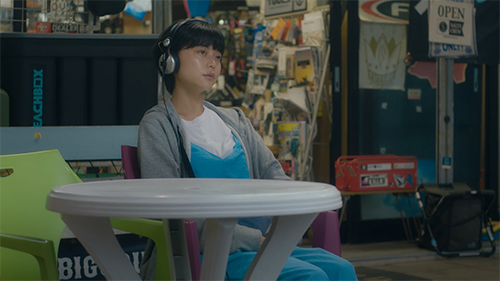
A wandering artist arrives in the small town of Kami-iida and sets out to document the past. His art project forces the locals to look at what life there once was, and what it’s become.
In the rapidly aging town of Kami-iida, Yokohama, Mako’s late father has bequeathed her a tenant space in a dilapidated shopping center and a small apartment, which she shares with her roommate Sumire. Mako rents out the space and a room at their place to an itinerant artist named Tanishige, who plans a multimedia installation exploring the town’s past. Tanishige sets about recording the recollections of local elderly residents, who recount vivid memories of sports events, cultural festivals, and young people crowding the shopping center. The lively energy that once permeated the area has vanished, with few sons and daughters willing to take over the existing businesses. The dusty omikoshi (portable shrine) is brought out of storage and the procession reenacted by some local kids. Sumire, a procrastinating creator herself, initially resents Mako changing the dynamic in the apartment, but inadvertently ends up helping Tanishige complete his work. The experience leads her to make a decision.
■By filming in the town of his own grandparents, director TAKAHASHI Sota aimed to collaborate with local denizens and capture Kamiiida’s changing landscape. Many objects and memories may languish in “storage,” but this film shows that their spirit is alive just under the surface.
Other films: Order of screening time
USE BY YOUTH by TAKAGI Maru (51 min.) 『USE BY YOUTH』
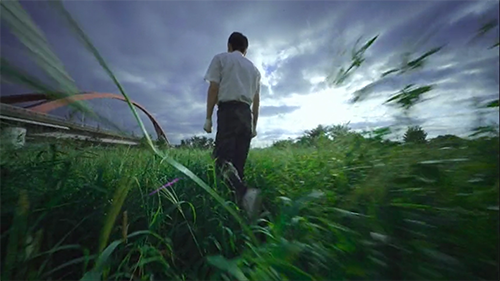
In a town where boys play punch-out games with each others’ faces, a traumatized youth who barely speaks somehow becomes the hero.
Under a suburban bridge, high school boys face off against each other in chalk circles, where they play bouts of rock-paper-scissors to decide who gets to punch who in the face next. It’s not a one-time dare –– it’s a way of life for Fumi and his agitators. When Fumi hits a losing skid, he calls on his mute buddy Sanada, whose fists are permanently wrapped in bandages. Sanada clubs the ringleader out cold. When Sanada was a child, he accidentally killed his pet mosquito with a smack so he keeps his hands taped up and prays to his beloved late pet every day. When Fumi and Sanada take a couple of girls out on a double-date, Sanada witnesses his girl, Emiri, kill a mosquito and instinctively punches her in the face. He has to make it up to Emiri. Meanwhile, Fumi battles to the end...
■Director TAKAGI Maru stated he aimed to “express the conflicts of each of the characters in an unusual worldview,” and took that to bursting extremes. Much of the film is shot with a fisheye lens, which along with the frenetic editing perfectly suits the warped environment the manic characters inhabit.
Run Away by YAMAGUCHI Marin (57 min.)『逃避』
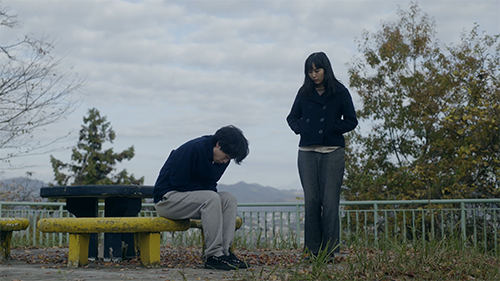
A late night road accident throws a young man’s career plans and relationship with his girlfriend into jeopardy. Their bond is tested, but will time heal all?
Near a train crossing in the dead of night, Kazuma crawls back to his vehicle after an accident with a bicycle and leaves the scene. He keeps the incident a secret from his live in girlfriend Ayano, but she finds a strange stain on his dirty laundry. Kazuma can’t concentrate for his upcoming medical school exam and sleeps all day, making Ayano become increasingly concerned over his erratic behavior. He even hides from a visiting police officer After a day trip to the countryside, Kazuma returns to the scene of the accident, unable to accept it. Ayano is there for emotional support but Kazuma doubts her commitment, causing a major rift between them. When the day arrives for Kazuma to face justice, he asks Ayano an important question.“Will you wait for me?”
■Drawing on his own life, director YAMAGUCHI Marin conceived of this film as a way to explore how a person gets back on their feet after major misfortune, and how those most important to them relate to the situation. The two lead performances carry the film and the unconventional insertion of flash forward scenes imbues the drama with more power than a conventional linear story.
Homo Amicusby MABUCHI Arisa (42 min.)『ホモ・アミークス』
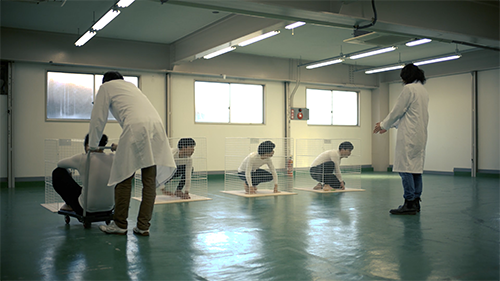
When a man takes a job at a scientific facility experimenting on human-like animals, he unexpectedly bonds with one of the creatures.
Tashiro interviews for a job at a peculiar scientific facility running experiments on a mysterious new animal known as Homo Amicus. Tashiro says he desires to “save lives” to make a good impression and lands the job. The Homo Amicus resemble humans but can only say the word “stop!” They live in numbered cages, given toys and dishes of food like dogs, and brutally disposed of once they’ve served their purpose. Tashiro senses that one of the beasts, number 802, is different than the others. He discovers 802 can only go to sleep if he lets it suck his thumb –– they develop a bond. Meanwhile, a man looks after his wheelchair-bound wife, whose condition is rapidly worsening. Her husband must make a choice. How will the two stories intersect? An incident at the facility causes Tashiro to lose his job, but he can’t forget 802, leading to a literally uplifting finale.
■Director MABUCHI Arisa questions the sacrifice of one living thing for another’s benefit in this strangely affecting portrait of a man who becomes keenly aware of the spirit of sentient beings. Overcomes its low budget with effective use of locations and staging.
See You Next Week... by HYNES Mariko (36 min.) 『また来週』
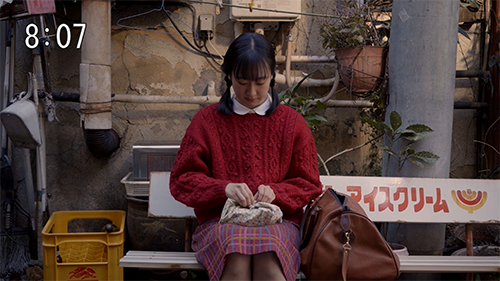
The life of a girl in high school begins to mirror the lead character in the morning TV drama she’s obsessed with.
In post-WWII Japan, a young girl (MORIKAWA Chihiro) tells her conservative parents she wants to go to Osaka to fulfill her dream of becoming an actress. We realize it’s a morning TV drama playing out, watched by high school student Asako (also played by MORIKAWA Chihiro). Asako’s morning TV ritual makes her late for school every day, angering her home room teacher and exasperating her hard-working single mother. Her guidance counselor is sympathetic, and Asako confides in her that she has similar aspirations of becoming an actress. Asako also develops a friendship with her cultured classmate Yuka, who plays the violin beautifully. Asako’s other classmates are not so kind, laughing at Asako for the similarity of her plight to the drama’s protagonist. All of the characters gradually spill over into both worlds, with fiction and reality seemingly influencing each other as they converge. How will the story end for both Asakos?
■Director HYNES Mariko perfectly captures the tone and style of Japan’s beloved NHK morning dramas and intercuts fiction and reality until they blend seamlessly. This entertaining film brimming with creativity is also a sharp commentary on the ideals fiction can drive us to live up to.
Half Timeby Zhang Yaoyuan (30 min.)『ハーフタイム』
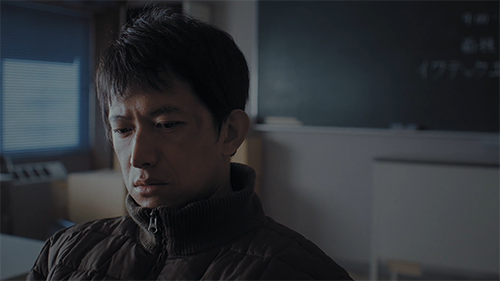
A Chinese laborer working in Japan tries his best to play by the rules to support his family back home, but faces adversity at every turn.
Japan-based Chinese laborer Qingyang struggles to explain himself in Japanese at his latest job interview, but fails. He’s then berated by his local Chinese employment coordinator. This only adds to his hardship of unpaid wages due to his previous vegetable factory’s closure in Okinawa. He drinks with his dorm mate, who decides to go on the run and find work illegally. “If you want money, forget about saving face,” he says. While Qingyang is desperate to support his wife and son back home, he doesn’t want to break the rules as a visa overstayer. Unfortunately, his colleague’s actions affect his situation negatively and his wife threatens to leave him. A non-profit labor lawyer convinces Qingyang to trust his efforts to protect his rights. Qingyang steels himself for another interview, but there’s a shocking turn of events...
■Director ZHANG Yaoyuan depicts the plight of Japan-based laborers who hail from his own region of Northeastern China, which many fled due to the government’s retrenchment policies. In its 34 minutes, the film captures the raw reality of the exploitation many Asian laborers face under Japan’s technical intern training program, sometimes at the hands of their own compatriots.
On a Long Summer Dayby Liu Ge (28 min.) 『ただいまはいまだ』
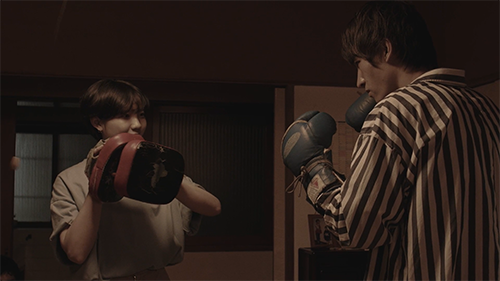
Two Chinese residents living in Japan reunite during the border restrictions of the pandemic and bond over their life decisions with a Japanese friend.
Chinese exchange student Li visits his buddy Taro in the suburbs to find the apartment of estranged childhood friend Gao (Li’s and Gao’s fathers are old friends). Gao’s not home but contacts Li soon after and meets them at the park. Li implores Gao to call his father in China, but Gao refuses to leave Japan as he wouldn’t be able to return under the current pandemic border conditions. Li feels no stress over staying put –– he enjoys Tokyo. When Taro invites them over for dinner, Gao initially refuses but later joins. Along with Taro’s sister Asuka, the four bond over talking about their lives and complicated paternal relationships. Taro reveals he failed to become a pro boxer like his dad. After dinner and drinks, Taro gets the old boxing gear out and both Gao and Li try punching for the first time. It becomes a release. The morning after, personal decisions are made.
■Director LIU Ge portrays friendship between Japanese and non-Japanese residents in a refreshingly matter-of-fact way, without platitudes or grand statements on differences. He draws naturalistic performances from his cast and accomplishes layered storytelling that belies the film’s running time. A lightning-backed conversation on the balcony is impressive.
Flip-Up Tonicby WAKUI Ryo (26 min.)『Flip-Up Tonic』
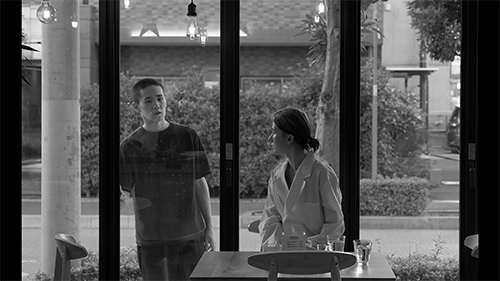
A university student applies for a trial session with a humanoid robot developed on campus and becomes shocked when it goes missing.
First year university student Tarano signs up for a paid session where he will experience time spent in the company of a humanoid robot developed in the science department. After signing a non-disclosure agreement and handing over his smart phone, Tarano, the android’s creator Dr. Sinntow, and the android, which goes by the moniker of LEACHAR (“Laboratory Engineered Astonishingly Capable Human Android Robot”) head to a local café for a chat. Tarano is stunned by the perfectly lifelike appearance of the robot. After a slip-up with a glass of water forces Tarano to change shirts, he’s shocked to find LEACHAR has left the scene and heads back to the campus with Sinntow. He’s paid his participation fee and is none the wiser to the surprising truth of the experiment...
■With its crisp black-and-white photography and non-linear storytelling, director WAKUI Ryo aimed to pay homage to both classic cinema and famous movies with time-jumping narratives. The order the chapters play out creates tension, embellished by a clever twist.
Sad Colorby TAKAHASHI Eiichi (24 min.)『サッドカラー』
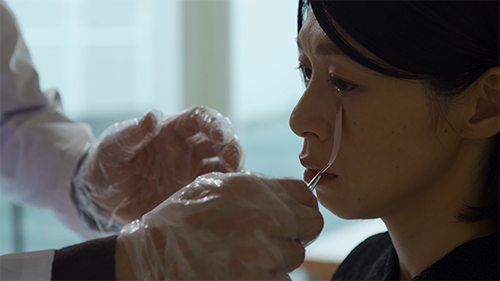
When a woman is diagnosed as lacking the ability to feel sadness, her husband confines her to their apartment until she recovers, but the situation devolves into madness.
Matome is unsettled by his wife Mia’s recently happy state. He urges her to get examined by a medical specialist, who analyzes Mia’s tears and determines that she’s unable to feel the emotion of sadness. She denies the result, but her husband is shattered by the truth. Believing that a human missing this emotion is a danger to others, Matome confines Mia to their apartment and attempts help her recover with peculiar notions of things that make people sad (such as having to eat a slice of burnt toast). After Mia’s initial anger passes, she begins to question whether sadness is a necessary emotion at all. In a last bid effort to force Mia’s sadness to return Matome makes the ultimate sacrifice, but how will it affect Mia’s existence?
■Influenced by the writings of philosopher Benedictus de Spinoza, filmmaker TAKAHASHI Eiichi skillfully employs geometric framing and chiaroscuro lighting to depict a semi-dystopian world where emotions can be scientifically analyzed with mathematical precision.
Time of Absence by KAWAGUCHI Junya (21 min.)『不在の出来事』
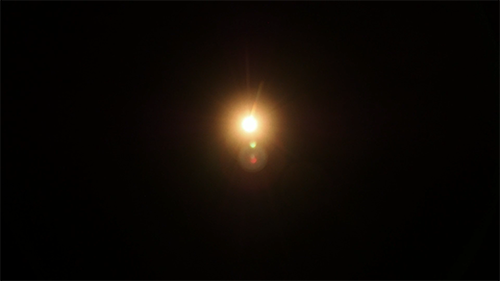
A man carries out his daily chores before leaving the house, after which the space seems to come alive with a little help from nature.
A young man living alone wakes up and goes about his daily routine. He gets dressed, hangs the laundry out on the veranda, and washes up the sink full of dishes. He gets a call from his girlfriend and agrees to meet up. After he leaves the apartment, nature takes over. With charming piano accompaniment, the wind choreographs a beautiful dance performed by the curtains, the socks hanging outside, and stray tufts of cotton. Scattered shopping receipts traverse the floor like migrating fish. Doors open and close by invisible hands. Rivulets of water drizzle down fixtures like natural springs. Condensation forms on a wall like a forehead perspiring on a hot summer day. Even the setting sun is alive within the door’s peephole, until...
■Director KAWAGUCHI Junya (who also shoots, edits, and stars in the film) turns an average Tokyo apartment into a stage for nature to put on a spectacular show. The director has a keen eye for beautiful details that most of us overlook in our busy lives.
Chotto Hakuneby OHNO Senari (20 min.)『ちょっと吐くね』
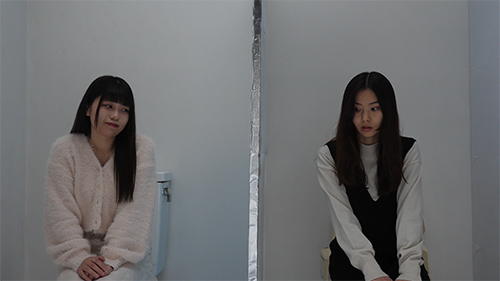
Two young women at university bond over their psychological need to secretly throw up, and learn about themselves in the process.
At the university dining hall, Yuzusa asks her boyfriend for a bite of curry but immediately goes to throw up. She has been hiding her eating disorder. On another day at the same toilet, Yuzusa overhears a girl vomiting in the adjacent stall and asks if she’s okay. Art student Shizuha is also afflicted and the pair strike up an anonymous relationship over the partition in the little-used washroom, agreeing to meet regularly. Yuzusa confesses that she wants to become as cute as Elsa Schiaparelli’s “shocking pink,” while Shizuha is relieved that someone like Yuzusa also pukes. In the meantime, Yuzusa’s boyfriend struggles to accept her eating habits and disagrees that it will help her overcome her self image issues. After the pair of girls finally come face to face, they realize their feelings about throwing up differ...
■Director OHNO Senari discovered a considerable number of her friends had experienced eating disorders, and conceived of this film as a way to work through her feelings of undue attention and evaluation toward her own abnormalities. The constructed set of the two toilet stalls and metaphorical visual of paint-pouring artwork are astute creative choices.
Kokorozashi to Tokyo by SUZUKI Rintaro (10 min.) 『こころざしと東京の街』
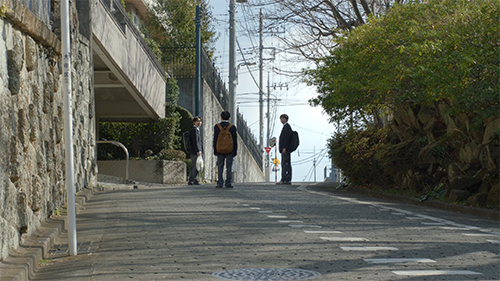
The day arrives for two high school classmates to declare their future plans. One of them has precise goals while the other is undecided. When the chance to have some innocent fun arises, they reach a crossroads.
Sato and Kanemoto are two second-year high school classmates coming to the end of their third term, and today is the deadline to submit their career aspiration surveys. Kanemoto is ahead of the game, with a highly practical approach to his university and career pursuits. Sato is the opposite – ambivalent about what direction he wants to take in life. He asks Kanemoto to wait for him so they can leave together. By the end of the school day, Sato fortunately receives a one-day extension to research his options and make his final submission. On the walk home with Kanemoto, they run into two other classmates who invite them out to a bout of karaoke. Kanemoto remains diligent about his studies while Sato gives in to temptation, despite Kanemoto’s muted disappointment. Along the way Sato changes his mind, but is it too late?
■Director SUZUKI Rintaro skillfully uses mundane locations – desks, residential streets, and train platforms – as a microcosm to stage the paths, diversions, and disorientation in the two boys’ lives.
Parking Area by MASUYAMA Toru (9 min.)『Parking Area』

A woman stops at a highway rest area and enters a portal to another world, before getting back on the road to an even more epic destination.
A Mazda travels smoothly along the highway. We float inside the car through the rear window and find a woman asleep in the seemingly self-driving vehicle. She awakens and we are briefly inside the world of her eye. At dusk, she stops at a highway rest area and uses a massive restroom with infinite sinks to wash her hands. She explores the structure and crosses a walkway into a futuristic urban landscape. Building surfaces shimmer and coruscate organically. Solar panels fan open and recede like flower petals. Freeways spiral into the sky, forming geometric patterns that recall natural wonders. But there are no other humans to be seen. She returns to the rest area, and back onto the highway. After her car emerges from a tunnel, it goes on a spectacular celestial journey.
■Director MASAYAMA Toru defies the low budgets that restrict a lot of live action filmmakers and creates stunning worlds completely created on his iPhone and MacBook Pro. Inspired by an incident on one of the director’s road trips back to his own home town.
『Sewing Love』by Xu Yuan (8 min.)『Sewing Love』
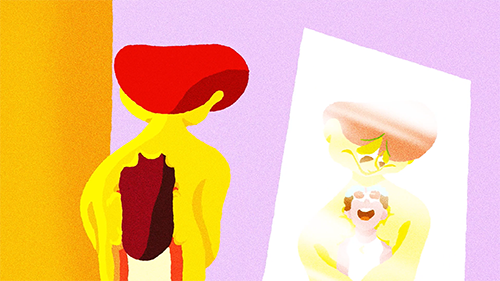
A couple’s love relationship ebbs and flows through pure joy and disturbingly dark episodes in this animated tour de force.
In the forest, a young man rescues a young girl from a rampaging boar. For him, it’s love at first sight. He envelops her into the human-shaped hole in his own body and they literally become inseparable as they float through a candy-colored, funky world of romantic joy. He wakes up from his reverie and discovers she’s gone, leading the boy on a dark, desperate quest to find her. She returns in a different form and he immediately imprisons her in his body-hole, but she breaks free again. He transforms into an ashen, crumbling figure as his rage grows. How could she dare to leave him? He brutally stitches her into his own body, where she becomes his prisoner. The reappearing butterfly representing her freedom leads the deformed pair to the moonlit treetops, where shocking fates befall them both.
■Love is a selfish emotion in the world of XU Yuan’s 8-minute animated epic. This organically animated film is in a constant, stunning flow-state while SATO Nanami’s diverse music perfectly complements the ever-transforming nature of the couple’s relationship.
The Story of My Meat Lifeby ISHIKAWA Mai (5 min.)『肉にまつわる日常の話』
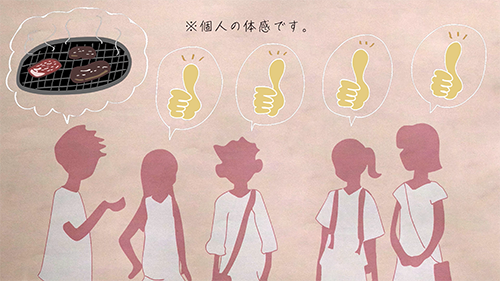
In this energetically animated short, a young woman examines her lifelong dislike of meat while not strictly following a vegetarian or vegan lifestyle.
In Japan, yakiniku is the meal of choice for gathering friends whatever the occasion, states the narrator over animated sizzling chunks of meat. There’s only one problem –– she hates meat. Back in her childhood, she saw an animal-themed movie (cue cute pigs made of paper) and found out the truth of where our pork comes from. She felt guilty about throwing away so many meat-filled school lunches (the screen fills with meaty illustrations) but eventually discovered delicious alternatives, including a particular shrimp-flavored soup she would hunt down at convenience stores. Now, she carefully inspects the ingredients of all the products she buys, checking for the dreaded kanji for meat (which fills the screen). She’s not vegan or vegetarian –– she’s just not a fan of meat, and enjoys cooking with non-meat ingredients. She wonders if all of these positive lifestyle changes would’ve happened if it weren’t for that one movie...
■Director ISHIKAWA Mai, who also narrates, takes a multi-media approach to her topic, blending stop-motion origami, animation-filtered footage, and handwritten text. The film also makes a strong case for the influence one movie can have on someone’s life.
Retake by NAKANO Kota (110 min.)『リテイク』

A female student decides on a whim to make a movie over her high school’s summer break, enlisting the help of four old and new friends. The relationship dynamics change as the group get closer to finishing the movie.
High schooler Kei takes photos as a hobby. He treasures some covertly snapped images of a girl in his school named Yu (his crush unbeknownst to her). One day, Yu catches Kei sneaking a picture of her from a local bridge. She suddenly declares she wants to direct a movie and asks him to be her cameraman and to find her a lead actor. Kei calls up his old buddy Jiro, who has drawing skills, and he’s immediately cast as a painter. Yu’s classmate Umi will assist the production and act alongside Jiro as a couple who journey to a land where time has stopped. The team realizes their sound is lacking and secretly borrow a proper mic from the broadcast club. Kei impulsively hires Yu’s ex-bandmate Arisa to record. As the quintet shoot each scene, their personal feelings and histories are revealed, particularly during the “retakes”...
■The first half of the film plays out in linear fashion until, following its namesake, director NAKANO Kota brilliantly doubles and triples the story back on itself to add richness and texture to the main plot. The final sequence takes the concept even further, illustrating that filmmaking itself is living in the moment.
**Runner-Up Prize**
Touch by TAKADA Kyosuke (56 min.) 『ふれる』

An elementary schoolgirl comes to terms with the loss of her mother and changes in her family over the final summer in her hometown before moving away.
10-year-old Misaki is a precocious, sensitive girl who still feels the presence of her late mother at home. Misaki sets a place for her mom at the table and won’t let anybody sit in her chair. Her father now has a new girlfriend and wants the family to move on as best they can, but accepts that Misaki takes life at a different pace than her older sister. Misaki’s hobby is pottery and she receives lessons with a local potter, feeling solace when shaping the clay in her hands. After accidentally breaking a classmate’s artwork at school, Misaki runs away from home. That evening she inadvertently joins a traditional obon festival procession and has an unexpected encounter, before waking up in hospital with a bandaged head. The family prepare to leave the ghosts of the old house behind and move to a neighboring city, but Misaki will carry some things with her for the rest of her life...
■Director TAKADA Kyosuke crafts an impressively mature, sure-handed drama which beautifully captures the presence of someone who has left the physical world. Young actress SUZUKI Yui, who plays Misaki, is a true discovery.
*Special Jury Prize*
The Bon Festival(working title) by TERANISHI Ryo ( 28 min.) 『うらぼんえ』

An art class teacher is influenced by a student to create a painting dedicated to his late son, who drowned as a child. When he later helps a middle-aged man who collapses at the beach, it leads to a surprisingly poignant realization.
Shinji has recurring dreams of reaching out to save his son Keita, who drowned as a youth. So vivid, in fact, that he wakes up with an injured arm from the tight grip of a hand. In the art class Shinji teaches, one of his students paints a mukasari ema (portrait of a post-mortem marriage), which inspires Shinji to do the same for his son. When his students accompany him to the the seashore location depicted in his previous painting, Shinji helps revive a drunken, middle-aged man. He accompanies the man back to his house, where his family carry out preparations for the coming obon period. Shinji is surprised to notice that their son is a dead ringer for Keita. He calls his mother to tell her, but she has an even more surprising revelation...
■Filmmaker TERANISHI Ryo collaborated with his cast from the writing phase, which gives this short a thoughtful, carefully developed feel. The unexpected reversal of fate is handled with a sure hand, with a poetic visual payoff that embodies the true spirit of obon.
*Special Jury Prize*
Cage by TACHIBANA Ryo (66 min.) 『鳥籠』

The bonds between a tight group of four, aimless suburban teens begin to fracture when an older neighborhood boy introduces them to drugs.
Kodai, Jin, Kengo, and Kazuki have grown up together on the streets of their suburban neighborhood. They spend their days hanging out in the local park, shooting hoops, smoking, and listening to hip hop. They all put up with issues at home and don’t have much hope for the future beyond getting jobs after high school, except for Kodai, who has a vague desire to go to university and have a family one day. One night, an older neighborhood boy introduces them to marijuana. Kazuki quickly becomes the point man for the dealer, encouraging his buddies to continue smoking up. Jin and Kengo drift along with the situation but Kodai strongly feels he’s on the wrong path. Finally gaining support from his wayward, financially challenged mother, Kodai puts all his energies into studying for his university entrance exam. How will things turn out for these once inseparable buddies?
■Director TACHIBANA Ryo drew on his upbringing in the Osaka suburbs in depicting the divergences that a close-knit group of friends inevitably experience. The scenes play out in a naturalistic manner without any affectations among the young cast. TACHIBANA tells a familiar story with a fresh approach.
*Special Jury Prize*
ReversiblelbisreveR (working title) by ISHIDA Shinomichi (77 min.) 『リバーシブル/リバーシブル』

A man living with a mental disorder works as a driver for an outcall escort service to support his son and meet women.
Middle-aged Shinpei lives with mental issues and is supported by regular visits from his caregiver. She encourages him to stick to his meds, take regular baths, and tidy up. While Shinpei has trouble with self-care, he’s also cognizant enough to get a job to support his adult son, Kai. Accompanied by Kai, he drives escort women to and from their outcalls and carries out menial tasks at the dispatch office. He’s drawn to one quiet young woman in particular named Misaki. Misaki claims she can see fairies, which provides her solace. At dinner, Shinpei confesses his feelings and Misaki agrees to spend time with him. Shinpei is overjoyed, but his caregiver has concerns about the reality of dating a woman engaged in sexual services. Kai is also rudely pranking Shinpei every night, so they hold a house meeting to decide how make everyone happier. Is it all a figment of Shinpei’s imagination? Does it matter?
■Director ISHIDA Shinomichi worked as a caregiver for 12 years and draws on his experience with those suffering from schizophrenia in crafting his protagonist. The film’s strong empathy for its troubled characters and their desires makes it relatable despite the societally “difficult” position they inhabit.
**Entertainment Award (Hori Pro Prize)* *
Perfect Young Lady by WATANABE Ryuhei (65 min.) 『完璧な若い女性』

Two childhood friends hang out in their hometown during their summer break as they’re carried along by a mysterious cassette of pop songs.
Kurobe is a Tokyo freeter who’s back in Shizuoka for the annual summer fireworks. He runs into his childhood chum Erika on the streets and the pair casually agree to drive around in her estranged father’s vintage Volvo. Erika shares a tape cassette of pop songs delivered to her house by an anonymous artist known as “Perfect Young Lady.” Were they recorded by Kurobe’s childhood crush, Shione? As the pair hang out and talk over the old days and issues with their folks, the slow summer is punctuated by music videos of a cute girl singing in various town locales they visit: the abandoned water park, a retro bowling alley, and a love hotel. Will Kurobe discover the true identity of the “perfect young lady”? Is she even real? In the end it may not matter, as Kurobe and Erika discover something more valuable along the way.
■Director WATANABE Ryuhei draws from the kayōkyoku (hit song) movies of the 1950s to 1970s, where lyrics inspired freewheeling love stories with musical numbers. With its colorful, Showa-style opening credits and infectious musical interludes, the film is more than pastiche as it delves into the true nature of personal relationships.
* Cinema Fan Award (Pianist Prize) *
See You Then by ISHIKAWA Taichi (52 min.) 『じゃ、また。』

When a former filmmaker now dwelling as a hikikomori is suddenly visited by an old classmate, he’s given a second chance at a creative life.
27-year-old Nariyasu spends his days lying around doing absolutely nothing. He doesn’t even know what month it is. A figure suddenly appears in his apartment. It’s his old film school mate, Shuta. Shuta looks through Nariyasu’s books, but strangely claims “I came here because I thought you were searching for something.” Shuta pushes Nariyasu to continue playing their board game of Life, which they never finished years ago. The pair shot a movie together at film school, but it remains uncompleted. Nariyasu ran out of ideas, failed at his job search, which has led to his current inert state. “I can’t call it living,” he admits. Nariyasu follows Shuta out of the apartment and into a deserted cinema and gets knocked out. The story replays from the beginning and we’re now given an additional detail –– Shuta is already dead. But why has he paid this visit to Nariyasu?
■Stories that take place during obon naturally focus on family members, but director ISHIKAWA Taichi (who also plays Nariyasu) switches it up to a dearly departed friend. The tight confines of the apartment are keenly framed, with the cinema set evoking a separate compartment of the protagonist’s mind.
* Audience Award *
Memory Devices by TAKAHASHI Sota (71 min.) 『移動する記憶装置展』

A wandering artist arrives in the small town of Kami-iida and sets out to document the past. His art project forces the locals to look at what life there once was, and what it’s become.
In the rapidly aging town of Kami-iida, Yokohama, Mako’s late father has bequeathed her a tenant space in a dilapidated shopping center and a small apartment, which she shares with her roommate Sumire. Mako rents out the space and a room at their place to an itinerant artist named Tanishige, who plans a multimedia installation exploring the town’s past. Tanishige sets about recording the recollections of local elderly residents, who recount vivid memories of sports events, cultural festivals, and young people crowding the shopping center. The lively energy that once permeated the area has vanished, with few sons and daughters willing to take over the existing businesses. The dusty omikoshi (portable shrine) is brought out of storage and the procession reenacted by some local kids. Sumire, a procrastinating creator herself, initially resents Mako changing the dynamic in the apartment, but inadvertently ends up helping Tanishige complete his work. The experience leads her to make a decision.
■By filming in the town of his own grandparents, director TAKAHASHI Sota aimed to collaborate with local denizens and capture Kamiiida’s changing landscape. Many objects and memories may languish in “storage,” but this film shows that their spirit is alive just under the surface.
Other films: Order of screening time
USE BY YOUTH by TAKAGI Maru (51 min.) 『USE BY YOUTH』

In a town where boys play punch-out games with each others’ faces, a traumatized youth who barely speaks somehow becomes the hero.
Under a suburban bridge, high school boys face off against each other in chalk circles, where they play bouts of rock-paper-scissors to decide who gets to punch who in the face next. It’s not a one-time dare –– it’s a way of life for Fumi and his agitators. When Fumi hits a losing skid, he calls on his mute buddy Sanada, whose fists are permanently wrapped in bandages. Sanada clubs the ringleader out cold. When Sanada was a child, he accidentally killed his pet mosquito with a smack so he keeps his hands taped up and prays to his beloved late pet every day. When Fumi and Sanada take a couple of girls out on a double-date, Sanada witnesses his girl, Emiri, kill a mosquito and instinctively punches her in the face. He has to make it up to Emiri. Meanwhile, Fumi battles to the end...
■Director TAKAGI Maru stated he aimed to “express the conflicts of each of the characters in an unusual worldview,” and took that to bursting extremes. Much of the film is shot with a fisheye lens, which along with the frenetic editing perfectly suits the warped environment the manic characters inhabit.
Run Away by YAMAGUCHI Marin (57 min.)『逃避』

A late night road accident throws a young man’s career plans and relationship with his girlfriend into jeopardy. Their bond is tested, but will time heal all?
Near a train crossing in the dead of night, Kazuma crawls back to his vehicle after an accident with a bicycle and leaves the scene. He keeps the incident a secret from his live in girlfriend Ayano, but she finds a strange stain on his dirty laundry. Kazuma can’t concentrate for his upcoming medical school exam and sleeps all day, making Ayano become increasingly concerned over his erratic behavior. He even hides from a visiting police officer After a day trip to the countryside, Kazuma returns to the scene of the accident, unable to accept it. Ayano is there for emotional support but Kazuma doubts her commitment, causing a major rift between them. When the day arrives for Kazuma to face justice, he asks Ayano an important question.“Will you wait for me?”
■Drawing on his own life, director YAMAGUCHI Marin conceived of this film as a way to explore how a person gets back on their feet after major misfortune, and how those most important to them relate to the situation. The two lead performances carry the film and the unconventional insertion of flash forward scenes imbues the drama with more power than a conventional linear story.
Homo Amicusby MABUCHI Arisa (42 min.)『ホモ・アミークス』

When a man takes a job at a scientific facility experimenting on human-like animals, he unexpectedly bonds with one of the creatures.
Tashiro interviews for a job at a peculiar scientific facility running experiments on a mysterious new animal known as Homo Amicus. Tashiro says he desires to “save lives” to make a good impression and lands the job. The Homo Amicus resemble humans but can only say the word “stop!” They live in numbered cages, given toys and dishes of food like dogs, and brutally disposed of once they’ve served their purpose. Tashiro senses that one of the beasts, number 802, is different than the others. He discovers 802 can only go to sleep if he lets it suck his thumb –– they develop a bond. Meanwhile, a man looks after his wheelchair-bound wife, whose condition is rapidly worsening. Her husband must make a choice. How will the two stories intersect? An incident at the facility causes Tashiro to lose his job, but he can’t forget 802, leading to a literally uplifting finale.
■Director MABUCHI Arisa questions the sacrifice of one living thing for another’s benefit in this strangely affecting portrait of a man who becomes keenly aware of the spirit of sentient beings. Overcomes its low budget with effective use of locations and staging.
See You Next Week... by HYNES Mariko (36 min.) 『また来週』

The life of a girl in high school begins to mirror the lead character in the morning TV drama she’s obsessed with.
In post-WWII Japan, a young girl (MORIKAWA Chihiro) tells her conservative parents she wants to go to Osaka to fulfill her dream of becoming an actress. We realize it’s a morning TV drama playing out, watched by high school student Asako (also played by MORIKAWA Chihiro). Asako’s morning TV ritual makes her late for school every day, angering her home room teacher and exasperating her hard-working single mother. Her guidance counselor is sympathetic, and Asako confides in her that she has similar aspirations of becoming an actress. Asako also develops a friendship with her cultured classmate Yuka, who plays the violin beautifully. Asako’s other classmates are not so kind, laughing at Asako for the similarity of her plight to the drama’s protagonist. All of the characters gradually spill over into both worlds, with fiction and reality seemingly influencing each other as they converge. How will the story end for both Asakos?
■Director HYNES Mariko perfectly captures the tone and style of Japan’s beloved NHK morning dramas and intercuts fiction and reality until they blend seamlessly. This entertaining film brimming with creativity is also a sharp commentary on the ideals fiction can drive us to live up to.
Half Timeby Zhang Yaoyuan (30 min.)『ハーフタイム』

A Chinese laborer working in Japan tries his best to play by the rules to support his family back home, but faces adversity at every turn.
Japan-based Chinese laborer Qingyang struggles to explain himself in Japanese at his latest job interview, but fails. He’s then berated by his local Chinese employment coordinator. This only adds to his hardship of unpaid wages due to his previous vegetable factory’s closure in Okinawa. He drinks with his dorm mate, who decides to go on the run and find work illegally. “If you want money, forget about saving face,” he says. While Qingyang is desperate to support his wife and son back home, he doesn’t want to break the rules as a visa overstayer. Unfortunately, his colleague’s actions affect his situation negatively and his wife threatens to leave him. A non-profit labor lawyer convinces Qingyang to trust his efforts to protect his rights. Qingyang steels himself for another interview, but there’s a shocking turn of events...
■Director ZHANG Yaoyuan depicts the plight of Japan-based laborers who hail from his own region of Northeastern China, which many fled due to the government’s retrenchment policies. In its 34 minutes, the film captures the raw reality of the exploitation many Asian laborers face under Japan’s technical intern training program, sometimes at the hands of their own compatriots.
On a Long Summer Dayby Liu Ge (28 min.) 『ただいまはいまだ』

Two Chinese residents living in Japan reunite during the border restrictions of the pandemic and bond over their life decisions with a Japanese friend.
Chinese exchange student Li visits his buddy Taro in the suburbs to find the apartment of estranged childhood friend Gao (Li’s and Gao’s fathers are old friends). Gao’s not home but contacts Li soon after and meets them at the park. Li implores Gao to call his father in China, but Gao refuses to leave Japan as he wouldn’t be able to return under the current pandemic border conditions. Li feels no stress over staying put –– he enjoys Tokyo. When Taro invites them over for dinner, Gao initially refuses but later joins. Along with Taro’s sister Asuka, the four bond over talking about their lives and complicated paternal relationships. Taro reveals he failed to become a pro boxer like his dad. After dinner and drinks, Taro gets the old boxing gear out and both Gao and Li try punching for the first time. It becomes a release. The morning after, personal decisions are made.
■Director LIU Ge portrays friendship between Japanese and non-Japanese residents in a refreshingly matter-of-fact way, without platitudes or grand statements on differences. He draws naturalistic performances from his cast and accomplishes layered storytelling that belies the film’s running time. A lightning-backed conversation on the balcony is impressive.
Flip-Up Tonicby WAKUI Ryo (26 min.)『Flip-Up Tonic』

A university student applies for a trial session with a humanoid robot developed on campus and becomes shocked when it goes missing.
First year university student Tarano signs up for a paid session where he will experience time spent in the company of a humanoid robot developed in the science department. After signing a non-disclosure agreement and handing over his smart phone, Tarano, the android’s creator Dr. Sinntow, and the android, which goes by the moniker of LEACHAR (“Laboratory Engineered Astonishingly Capable Human Android Robot”) head to a local café for a chat. Tarano is stunned by the perfectly lifelike appearance of the robot. After a slip-up with a glass of water forces Tarano to change shirts, he’s shocked to find LEACHAR has left the scene and heads back to the campus with Sinntow. He’s paid his participation fee and is none the wiser to the surprising truth of the experiment...
■With its crisp black-and-white photography and non-linear storytelling, director WAKUI Ryo aimed to pay homage to both classic cinema and famous movies with time-jumping narratives. The order the chapters play out creates tension, embellished by a clever twist.
Sad Colorby TAKAHASHI Eiichi (24 min.)『サッドカラー』

When a woman is diagnosed as lacking the ability to feel sadness, her husband confines her to their apartment until she recovers, but the situation devolves into madness.
Matome is unsettled by his wife Mia’s recently happy state. He urges her to get examined by a medical specialist, who analyzes Mia’s tears and determines that she’s unable to feel the emotion of sadness. She denies the result, but her husband is shattered by the truth. Believing that a human missing this emotion is a danger to others, Matome confines Mia to their apartment and attempts help her recover with peculiar notions of things that make people sad (such as having to eat a slice of burnt toast). After Mia’s initial anger passes, she begins to question whether sadness is a necessary emotion at all. In a last bid effort to force Mia’s sadness to return Matome makes the ultimate sacrifice, but how will it affect Mia’s existence?
■Influenced by the writings of philosopher Benedictus de Spinoza, filmmaker TAKAHASHI Eiichi skillfully employs geometric framing and chiaroscuro lighting to depict a semi-dystopian world where emotions can be scientifically analyzed with mathematical precision.
Time of Absence by KAWAGUCHI Junya (21 min.)『不在の出来事』

A man carries out his daily chores before leaving the house, after which the space seems to come alive with a little help from nature.
A young man living alone wakes up and goes about his daily routine. He gets dressed, hangs the laundry out on the veranda, and washes up the sink full of dishes. He gets a call from his girlfriend and agrees to meet up. After he leaves the apartment, nature takes over. With charming piano accompaniment, the wind choreographs a beautiful dance performed by the curtains, the socks hanging outside, and stray tufts of cotton. Scattered shopping receipts traverse the floor like migrating fish. Doors open and close by invisible hands. Rivulets of water drizzle down fixtures like natural springs. Condensation forms on a wall like a forehead perspiring on a hot summer day. Even the setting sun is alive within the door’s peephole, until...
■Director KAWAGUCHI Junya (who also shoots, edits, and stars in the film) turns an average Tokyo apartment into a stage for nature to put on a spectacular show. The director has a keen eye for beautiful details that most of us overlook in our busy lives.
Chotto Hakuneby OHNO Senari (20 min.)『ちょっと吐くね』

Two young women at university bond over their psychological need to secretly throw up, and learn about themselves in the process.
At the university dining hall, Yuzusa asks her boyfriend for a bite of curry but immediately goes to throw up. She has been hiding her eating disorder. On another day at the same toilet, Yuzusa overhears a girl vomiting in the adjacent stall and asks if she’s okay. Art student Shizuha is also afflicted and the pair strike up an anonymous relationship over the partition in the little-used washroom, agreeing to meet regularly. Yuzusa confesses that she wants to become as cute as Elsa Schiaparelli’s “shocking pink,” while Shizuha is relieved that someone like Yuzusa also pukes. In the meantime, Yuzusa’s boyfriend struggles to accept her eating habits and disagrees that it will help her overcome her self image issues. After the pair of girls finally come face to face, they realize their feelings about throwing up differ...
■Director OHNO Senari discovered a considerable number of her friends had experienced eating disorders, and conceived of this film as a way to work through her feelings of undue attention and evaluation toward her own abnormalities. The constructed set of the two toilet stalls and metaphorical visual of paint-pouring artwork are astute creative choices.
Kokorozashi to Tokyo by SUZUKI Rintaro (10 min.) 『こころざしと東京の街』

The day arrives for two high school classmates to declare their future plans. One of them has precise goals while the other is undecided. When the chance to have some innocent fun arises, they reach a crossroads.
Sato and Kanemoto are two second-year high school classmates coming to the end of their third term, and today is the deadline to submit their career aspiration surveys. Kanemoto is ahead of the game, with a highly practical approach to his university and career pursuits. Sato is the opposite – ambivalent about what direction he wants to take in life. He asks Kanemoto to wait for him so they can leave together. By the end of the school day, Sato fortunately receives a one-day extension to research his options and make his final submission. On the walk home with Kanemoto, they run into two other classmates who invite them out to a bout of karaoke. Kanemoto remains diligent about his studies while Sato gives in to temptation, despite Kanemoto’s muted disappointment. Along the way Sato changes his mind, but is it too late?
■Director SUZUKI Rintaro skillfully uses mundane locations – desks, residential streets, and train platforms – as a microcosm to stage the paths, diversions, and disorientation in the two boys’ lives.
Parking Area by MASUYAMA Toru (9 min.)『Parking Area』

A woman stops at a highway rest area and enters a portal to another world, before getting back on the road to an even more epic destination.
A Mazda travels smoothly along the highway. We float inside the car through the rear window and find a woman asleep in the seemingly self-driving vehicle. She awakens and we are briefly inside the world of her eye. At dusk, she stops at a highway rest area and uses a massive restroom with infinite sinks to wash her hands. She explores the structure and crosses a walkway into a futuristic urban landscape. Building surfaces shimmer and coruscate organically. Solar panels fan open and recede like flower petals. Freeways spiral into the sky, forming geometric patterns that recall natural wonders. But there are no other humans to be seen. She returns to the rest area, and back onto the highway. After her car emerges from a tunnel, it goes on a spectacular celestial journey.
■Director MASAYAMA Toru defies the low budgets that restrict a lot of live action filmmakers and creates stunning worlds completely created on his iPhone and MacBook Pro. Inspired by an incident on one of the director’s road trips back to his own home town.
『Sewing Love』by Xu Yuan (8 min.)『Sewing Love』

A couple’s love relationship ebbs and flows through pure joy and disturbingly dark episodes in this animated tour de force.
In the forest, a young man rescues a young girl from a rampaging boar. For him, it’s love at first sight. He envelops her into the human-shaped hole in his own body and they literally become inseparable as they float through a candy-colored, funky world of romantic joy. He wakes up from his reverie and discovers she’s gone, leading the boy on a dark, desperate quest to find her. She returns in a different form and he immediately imprisons her in his body-hole, but she breaks free again. He transforms into an ashen, crumbling figure as his rage grows. How could she dare to leave him? He brutally stitches her into his own body, where she becomes his prisoner. The reappearing butterfly representing her freedom leads the deformed pair to the moonlit treetops, where shocking fates befall them both.
■Love is a selfish emotion in the world of XU Yuan’s 8-minute animated epic. This organically animated film is in a constant, stunning flow-state while SATO Nanami’s diverse music perfectly complements the ever-transforming nature of the couple’s relationship.
The Story of My Meat Lifeby ISHIKAWA Mai (5 min.)『肉にまつわる日常の話』

In this energetically animated short, a young woman examines her lifelong dislike of meat while not strictly following a vegetarian or vegan lifestyle.
In Japan, yakiniku is the meal of choice for gathering friends whatever the occasion, states the narrator over animated sizzling chunks of meat. There’s only one problem –– she hates meat. Back in her childhood, she saw an animal-themed movie (cue cute pigs made of paper) and found out the truth of where our pork comes from. She felt guilty about throwing away so many meat-filled school lunches (the screen fills with meaty illustrations) but eventually discovered delicious alternatives, including a particular shrimp-flavored soup she would hunt down at convenience stores. Now, she carefully inspects the ingredients of all the products she buys, checking for the dreaded kanji for meat (which fills the screen). She’s not vegan or vegetarian –– she’s just not a fan of meat, and enjoys cooking with non-meat ingredients. She wonders if all of these positive lifestyle changes would’ve happened if it weren’t for that one movie...
■Director ISHIKAWA Mai, who also narrates, takes a multi-media approach to her topic, blending stop-motion origami, animation-filtered footage, and handwritten text. The film also makes a strong case for the influence one movie can have on someone’s life.
